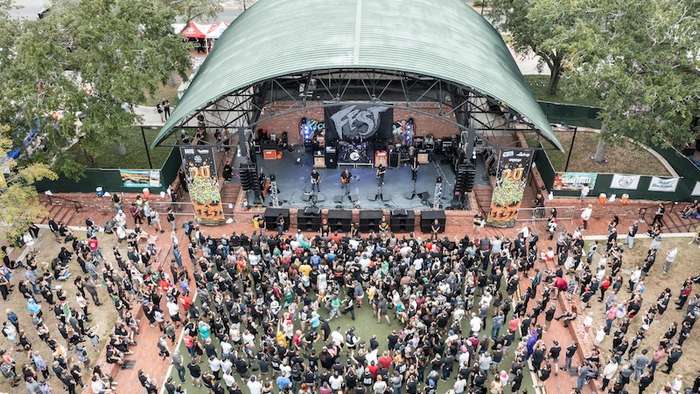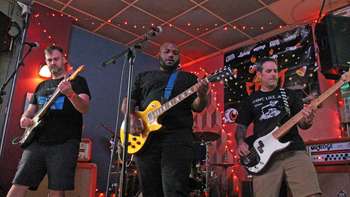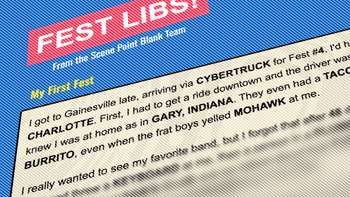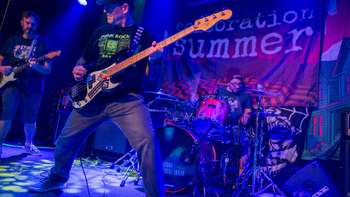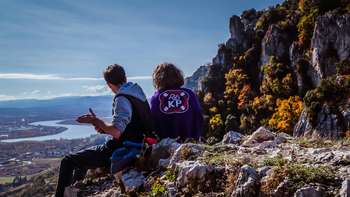For close to a quarter-century punk fans have flocked to Florida for The Fest.
Boasting a lineup of 300+ bands and roughly a dozen venues these days, the festival has grown, shifted and evolved. For several years the main stage has been in a large downtown park called Bo Diddley Plaza, named for the influential musician and one-time Gainesville resident.
While Fest is always adapting, it has consistently maintained a "built by us" DIY element even as it spans throughout downtown and has achieved city approval. As long-time Fest attendees, we wanted to hear more about how the Fest team turns a city park into a main venue that's loud and vibrant for 4 nights a year, but is mostly chill for the other 360-some days of the year.
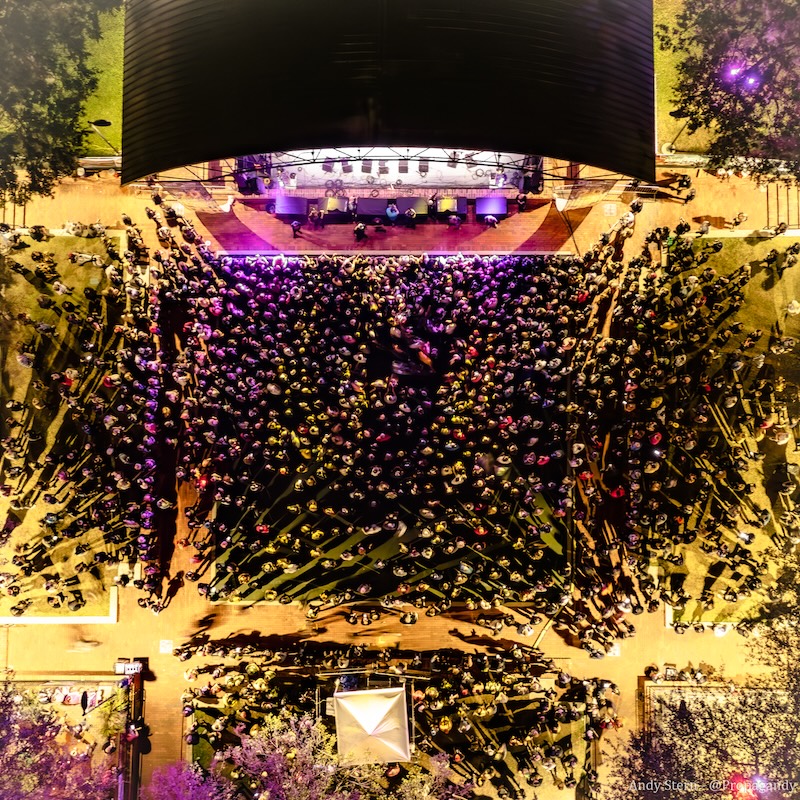
Scene Point Blank: As I understand it, Fest builds up everything except the literal, permanent stage at Bo Diddley Plaza. Is that correct? And what does that mean?
Jason Rockhill: We had to create a venue out of just an open field and a bandshell.
We have been tweaking it over the years and adding little bells and whistles but, for the most part, Bo Diddley Plaza is a city block in the middle of Gainesville, Florida. It's envisioned as a place where bands play with a lot of free events. But to set it up where you can serve alcohol and you're charging admission and you're trying to keep people who didn't pay the fee from getting in has been a trial and error.
Figuring out the best fence company to use. How many sandbags per fence post is the right amount? What happens when the wind blows a whole wall down on a Sunday afternoon?
We had to figure out all of those little things ourselves.
The first year we did it, we had some of the production crew from The St. Augustine Amphitheatre. At the time they were a county-run amphitheater where Widespread Panic plays five nights in a row and things like that, so they're a little more on the pro side of production. They came over and kind of led the way with map making and boundaries stuff.
"You should feel some responsibility if you're throwing an event like this if you give a shit about the safety of the people that come."
Ben Pratt: We got a loose blueprint from that --
Jason Rockhill: But we did a lot of the work too.
They were getting bigger and more popular and, it was only a couple months out from Fest, they decided they just couldn't do it [the next year]. So we had to take over and run with it. We learned a lot from them, but we had to learn a lot on the fly.
Ben Pratt: And it's worth saying as well that we are friends with those people. We've done Harvest of Hope with them in different capacities.
Jason was with Common Grounds, who did the beer stuff there. I was stage manager for Hot Water Music years ago. Some of those [St. Augustine] guys are from Gainesville, so there was always a connection. And Tony goes way back with those guys as well. I still reach out to them if I have questions about certain stuff.
Scene Point Blank: Had you ever done anything like this before, taking on something of this scale at this kind of location?
Jason Rockhill: Bo Diddley Plaza is a culmination of both of our experiences. Tony did this festival at JM University, MACRoCk, decades ago that Ben helped with. I used to road manage for bands. When I quit doing that, I bought in at Common Grounds, which is a venue that closed a while ago in Gainesville -- I have been involved in the behind the scenes logistics of making shows and being on tour. And no one does this kind of stuff in town at all, so it's a cool way to just figure it out and make it happen.
Ben Pratt: I go way back to Virginia with Tony. I wasn't a big part of MACRoCk. We all kind of pitched in and helped -- and then I moved down to Florida, in large part because of Tony and a lot of our friends that migrated down here. I never played music so I was always on the side of helping out…
And then we started doing this. As the years went by, we started taking on more roles together. It was pretty quick after the St. Augustine crew left that we started to figure out our roles. Through the years, we have really gotten solidified in what our roles are. If a question is thrown out, we're not wondering who should answer. It's clearly a question for me or a question for him.
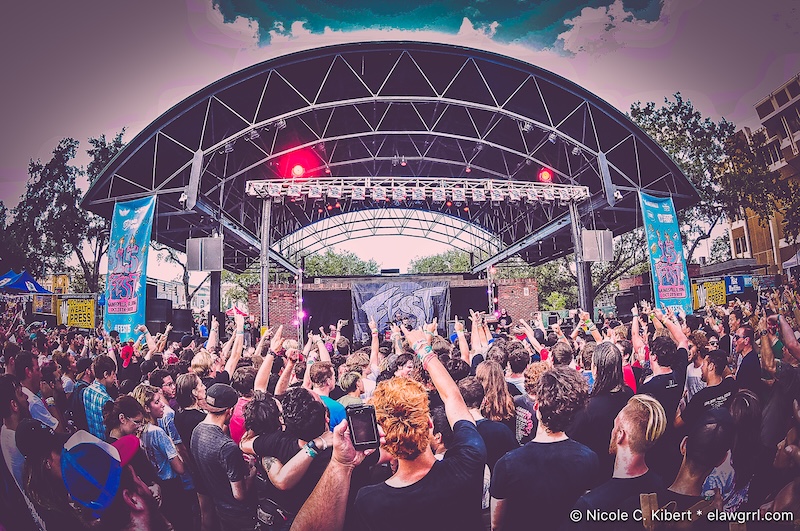
Scene Point Blank: Tony is the face of Fest but obviously there are a lot of people involved. Are you the face of Bo Diddley Plaza?
Jason Rockhill: I want to be behind-the-scenes, where we're invisible.
There are times during Fest where I feel like I have to have my hands really tight on the steering wheel, making sure that it's not going to crash into the mountain. That's more a problem with how I'm wired than what's going on, probably.
"The main thing is how bands feel they're treated."
Ben Pratt: Of all the staff, we're the only idiots that pretty much stay at our perch from the time we start building to when we're done on Sunday night at 2am. We always feel like we don't want anyone else to do what we do...
Scene Point Blank: How many people do you coordinate? Is it mostly volunteers?
Jason Rockhill: At any one time I've got 15, and probably over 200 [total] volunteers in our doors and general vicinity. The volunteers help with beer sales and stage managing -- throughout Bo Diddley and then in all the other venues, too.
Ben Pratt: Jason handles up front: capacity and dealing with gates and everything. He's stuck there, although he's trying to break out and train people that can stay there. He handles questions about wristbands, will-call, anything walk-up or bag checks. And if it's a long day, we'll have a group of volunteers and then another group of volunteers.
He trains them to work their shift. Because there's no test to volunteer, some people work better than others.
Jason Rockhill: Volunteers are not employees and you can't treat them like employees. They're here because they want to be here and maybe they're here because that's the cheapest way to get a ticket and that's fine.
Ben Pratt: Without volunteers we could not do Bo Diddley. We could not build everything. We have a whole buildout team that are volunteers. They're usually people that are here year after year. A lot of them are friends who can work with their hands. It helps a lot. If we didn't have volunteers -- you couldn't build a structure like that by paying people to build it.
Jason Rockhill: We could do it, but the tickets would be a lot more expensive, I guess.
Ben Pratt: Stagehands, credential checks, all the beer, all that [is volunteer work]. We have people that are paid in those positions that oversee all the volunteers. Back of house, we have a stage manager and an assistant stage manager. And then it's all volunteers.
The main thing is how bands feel they're treated. I think that's where we stand out. These volunteers are really helpful and they're usually fans of the bands. We're good to traveling artists and that's always been something that is important.
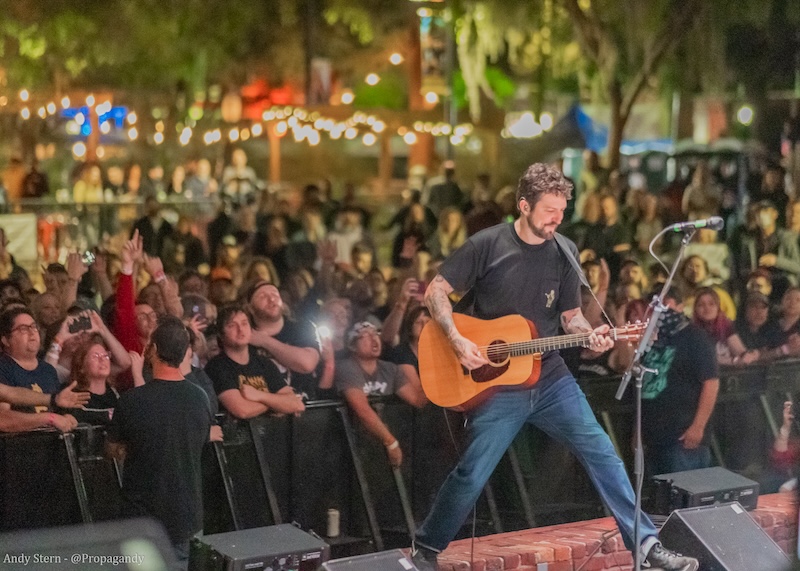
Scene Point Blank: You're working with a lot of people who I assume don't have much experience and you're giving them a crash course training. What goes into that?
I haven't seen any Fest trainwrecks. You're doing a good job with a team who, I assume, are a lot of rookies.
Jason Rockhill: We've had a few close ones.
Fest -- in general and even the volunteers -- is so smooth because most of the people who come to Fest are at shows and go to shows all year round, so there's less teaching people how to act.
Everyone's used to it and gets, "No, I don't stand right at the exit." There are unspoken ways you handle yourself at a large gathering of people. We don't have to figure it out as much because we have a really loyal group of people who come every year. We have this unified attitude across the board: bands, attendees, volunteers that are in on it.
Sometimes you do a show where first half is creating order. We don't have to do that because everyone wants to bounce around: catch a half set here, a half set three blocks away, and knows where they want to eat because they went there last year. They have been signing up for the same volunteer shifts every year for the last four years. We have the same crew for setup and tear down, or lots of the same people, because they want to be part of it and they're already on board.
There's occasional randomness, but we have this really strong foundation of people come here all the time. People know what to expect. People treat us fairly for the most part. And, that being said, even inside Bo Diddley we don't need a huge security thing. It's us.
"Without volunteers we could not do Bo Diddley."
Ben Pratt: We've never had a problem because someone is out of control. Someone's going to come to the front and grab one of us and we're going to go fix something that's going on.
You can't really do that at most festivals. We know our crowd and that's why that we tell the police not to come in unless we need them to.
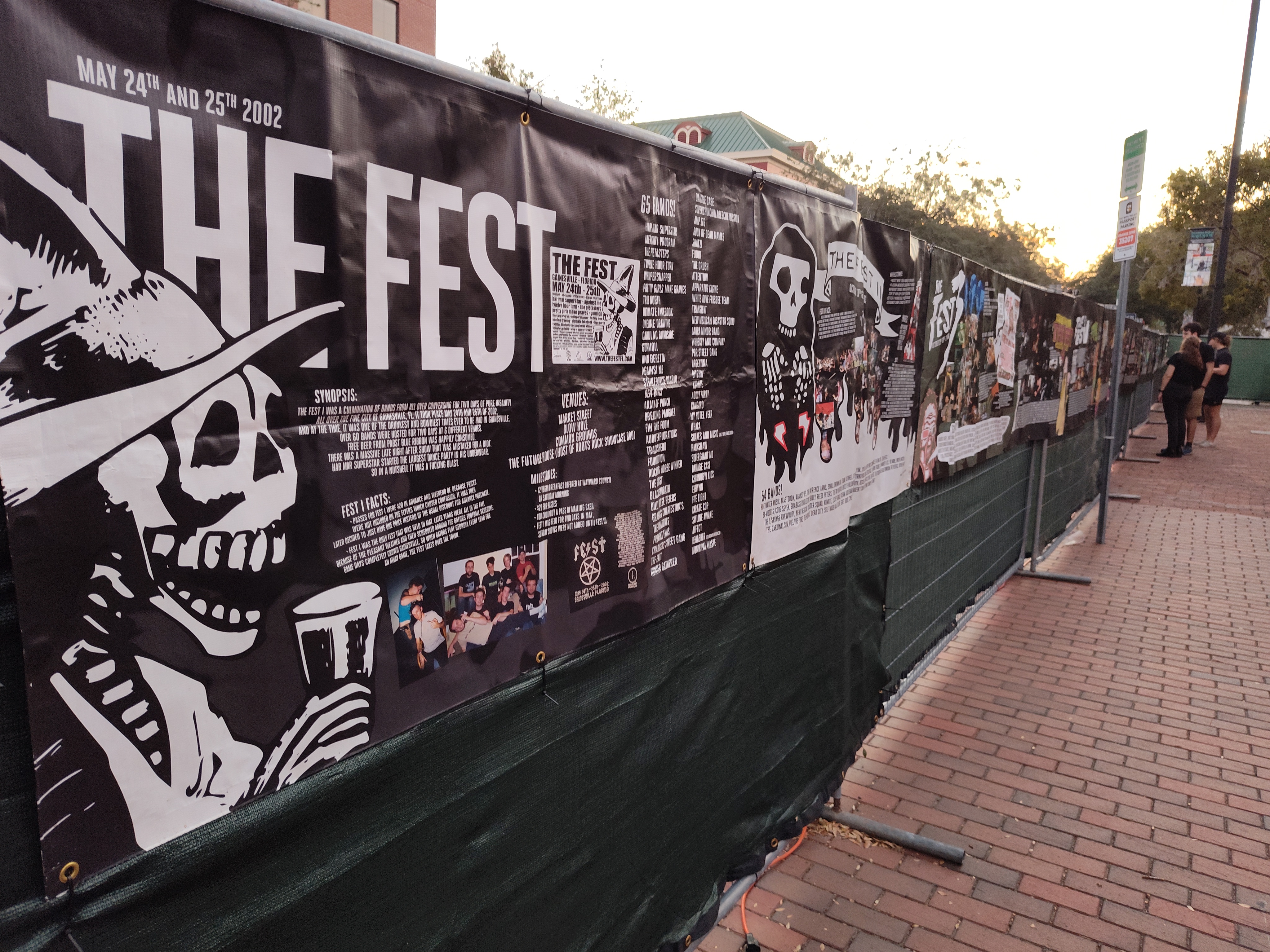
Scene Point Blank: They're frequently around the block or outside, but that's just part of their day job, I assume, so to speak.
Jason Rockhill: If you close off a street in any city in the country, you have to do that stuff. That's the way events are run. You let them know that we appreciate them being there, but we don't really need them too much and they're happy not being needed too much. And they sometimes have really weird interactions with people on the street...
Jason Rockhill: I like policing yourself. I resent being policed. You can create a situation where everyone's getting what they need to get. Everyone's here to have a good time and maybe you don't have to arrest that guy.
Ben Pratt: But keep in mind, while The Fest is overrun by festies the weekend of, it's still own town. So, there are college kids and stuff like that. And the clubs that are not part of what we do are there and they're intermingling...
Jason Rockhill: You have to be prepared for contingencies. When this happens, we know that this person's going to make this announcement. The world's a weird place. There have been years where I've been really stressed out about it and stayed to the front door and paid attention to every single transaction and worried. I've taught myself not to feel that way anymore.
You should feel some responsibility if you're throwing an event like this if you give a shit about the safety of the people that come. You have to take it seriously and you have to be ready for stuff that can happen and, at least in your head, thought about those realities.
Ben Pratt: The Vegas shooting happened and we were sitting there, looking up at the parking garage just across the street and it can't not go through your head. It's a frightening thing to think about…
Jason Rockhill: When Dimebag Daryl was shot, the local news came to Common Grounds to interview me about how dangerous it was to see a show at a club. It was a little bigger spot than Common Grounds but that could happen anywhere...
I said it before: we are blessed by having a group of people who come to see Fest, bands that come to Fest every year, people who volunteer who want to see it be successful.
It's really hard to consciously create goodwill. You do it by trying to do the right thing and I feel like we've managed to successfully do that...because everyone cares about these bands and wants to create a situation that's safe and cool for everybody...
"We're going to keep doing it until they stop us. It's a community effort and it's a lot of steps."
